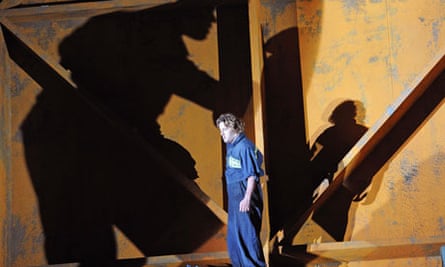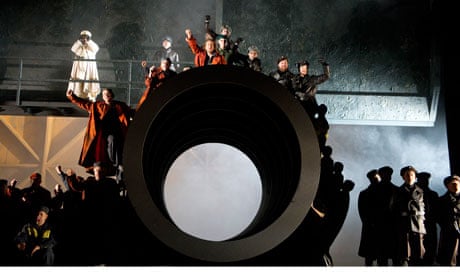Possibly the greatest and certainly the most relentlessly harrowing of Britten's operas has been well served by English National Opera over the last quarter-century. Tim Albery's production, memorable even in what was a golden age for the company in the mid 1980s, was followed by one by Neil Armfield with Simon Keenlyside in the title role. The latest staging by David Alden could well prove memorable too, though for different reasons.
With designs by Paul Steinberg, Alden shifts the action decisively away from the British man-of-war fighting the French in 1797 that Herman Melville's original novella and EM Forster and Eric Crozier's libretto specify. It's relocated in a rusting, steel-hulled vessel somewhere in Europe during the first decades of the 20th century, perhaps an early Soviet ship fighting a local war in the Baltic or the Black Sea, on which jack-booted officers maintain a regime of brutal suppression.
If Captain Vere's cabin looks strangely futuristic, and there are a few passing anachronisms and jarring references in the text, they hardly matter. Without the clutter of the Patrick O'Brian-style naturalism that is so regularly replicated in productions of Budd, Alden can focus on the sheer cruelty of the story; it's unremitting, bleak, and tremendously powerful by the final scene.

None of the characters emerge well from this reading, not even Benedict Nelson's Billy, who is never presented as the dominating heroic figure on which the story is predicated, though he brings real pathos to his final scene. Matthew Rose's Claggart is, though, terrifying – not for any obvious malevolence, but for the contained cruelty that his impassive presence projects, delivering his credo towards the end of the first act while fondling the neckerchief he has taken from Budd.
All the smaller roles are well taken, with Gwynne Howell's wonderfully touching Dansker as the single glimmer of humanity in a world from which such qualities have been eliminated, while Kim Begley's Captain Vere, presiding over all this in an immaculate white uniform, is even more self-serving than usual, appearing for Billy's execution in his prologue and epilogue guise as an old man, yet unable to watch what he has failed to prevent.
Britten's score is wonderfully conducted by Edward Gardner, the common denominator in the three Britten productions that the Alden brothers have staged at the Coliseum. The chorus's response is electrifying, whether in the two numbers in which Britten curiously seems to flirt with the Broadway musical, or in the huge set piece that opens the second act. Opinions may differ on the production itself, but the musical quality is unmistakable.

Comments (…)
Sign in or create your Guardian account to join the discussion